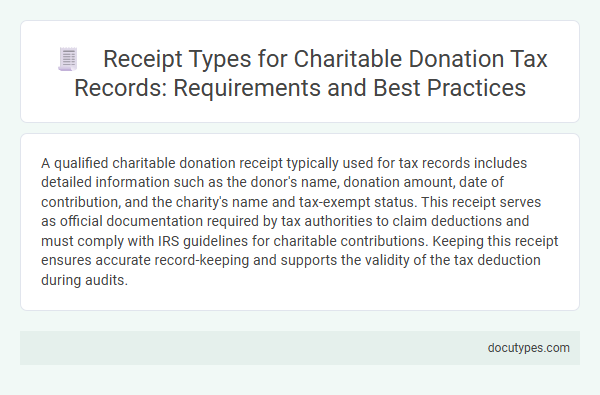A qualified charitable donation receipt typically used for tax records includes detailed information such as the donor's name, donation amount, date of contribution, and the charity's name and tax-exempt status. This receipt serves as official documentation required by tax authorities to claim deductions and must comply with IRS guidelines for charitable contributions. Keeping this receipt ensures accurate record-keeping and supports the validity of the tax deduction during audits.
Overview of Charitable Donation Receipts
| Type of Receipt | Acknowledgment Letter or Donation Receipt |
|---|---|
| Purpose | Serves as proof for tax deduction claims on charitable contributions |
| Key Elements Included | Donor's name, donation date, amount or description of donated items, name of the charitable organization, statement confirming no goods or services were provided in exchange |
| Format | Can be a printed or electronic document issued by the nonprofit organization |
| Usage | Your receipt is essential to validate donations when filing tax returns and claiming deductions with tax authorities |
| Recommendations | Keep receipts for all donations over a certain amount as required by tax regulations to ensure proper documentation |
Importance of Proper Donation Receipts
A donation receipt for charitable contributions is typically a written acknowledgment from the charity, confirming the donation amount and date. These receipts are essential for tax records to validate your contributions.
Proper donation receipts must include the charity's name, donation date, and value or description of the gift. They help substantiate tax deductions claimed on your returns, preventing issues with the IRS. Maintaining accurate receipts ensures transparency and supports your tax filing integrity.
Types of Acceptable Charitable Donation Receipts
Receipts used for charitable donation tax records typically include written acknowledgments from the charity. These receipts must clearly state the charity's name, the donation date, and the amount donated.
Acceptable types of charitable donation receipts include official donation letters, bank statements showing the transfer, and credit card statements. You should ensure the receipt specifies whether any goods or services were provided in exchange for the donation.
IRS Requirements for Charitable Donation Receipts
Charitable donation receipts are essential for tax records and must comply with specific IRS requirements to be valid. Your receipt should clearly document the donation details to support your tax deduction.
- Written Acknowledgment - Receipts must be a written acknowledgment from the charity confirming the donation date and amount.
- Charity Information - The receipt must include the name of the organization and a statement confirming whether any goods or services were received.
- Donation Value - The amount of cash given or a description of non-cash contributions must be accurately itemized on the receipt.
Maintaining proper charitable donation receipts ensures compliance with IRS rules and supports your tax deduction claims.
Key Information to Include on Donation Receipts
A receipt used for charitable donation tax records is typically a donation acknowledgment letter from the nonprofit organization. This receipt serves as proof of your donation for tax deduction purposes.
- Date of Donation - The receipt must include the exact date when the donation was made to verify the tax year.
- Donor Information - Your name and address should be clearly stated to ensure proper identification of the donation.
- Donation Description - The type and value of the donated items or the amount of cash given must be detailed for accurate tax reporting.
Differences Between Cash and Non-Cash Donation Receipts
Receipts for charitable donation tax records vary based on the type of donation: cash or non-cash. Cash donation receipts typically include the donor's name, the date of donation, and the amount contributed.
Non-cash donation receipts require detailed descriptions of the donated items, their fair market value, and the condition of the goods. Both types must meet IRS guidelines to ensure proper tax deduction documentation.
Receipts for Nonprofit Fundraising Events
Receipts for nonprofit fundraising events are essential for documenting charitable donations and ensuring tax compliance. These receipts typically include the donor's name, the donation amount, the date of the contribution, and a statement confirming that no goods or services were exchanged. Your receipt acts as proof for tax records and may help you claim a deduction on your tax return.
Digital vs. Paper Donation Receipts
Receipts for charitable donation tax records serve as proof of your contributions for tax deduction purposes. Choosing between digital and paper donation receipts depends on your preference and record-keeping habits.
- Digital Donation Receipts - Stored electronically, these receipts offer easy access and organization for tax records.
- Paper Donation Receipts - Traditional and tangible, paper receipts provide a physical backup for documentation.
- IRS Compliance - Both digital and paper receipts must include the charity's name, donation date, and amount to meet tax record requirements.
Common Receipt Mistakes and How to Avoid Them
Receipts for charitable donation tax records must include the donor's name, the date of the donation, and a detailed description of the items or amount donated. Common receipt mistakes include missing acknowledgment of non-cash contributions and failure to specify if any goods or services were provided in exchange. To avoid these errors, ensure your receipt clearly states the donation's value and confirms no goods or services were received, complying with IRS guidelines.
What Type of Receipt Is Used for Charitable Donation Tax Records? Infographic

